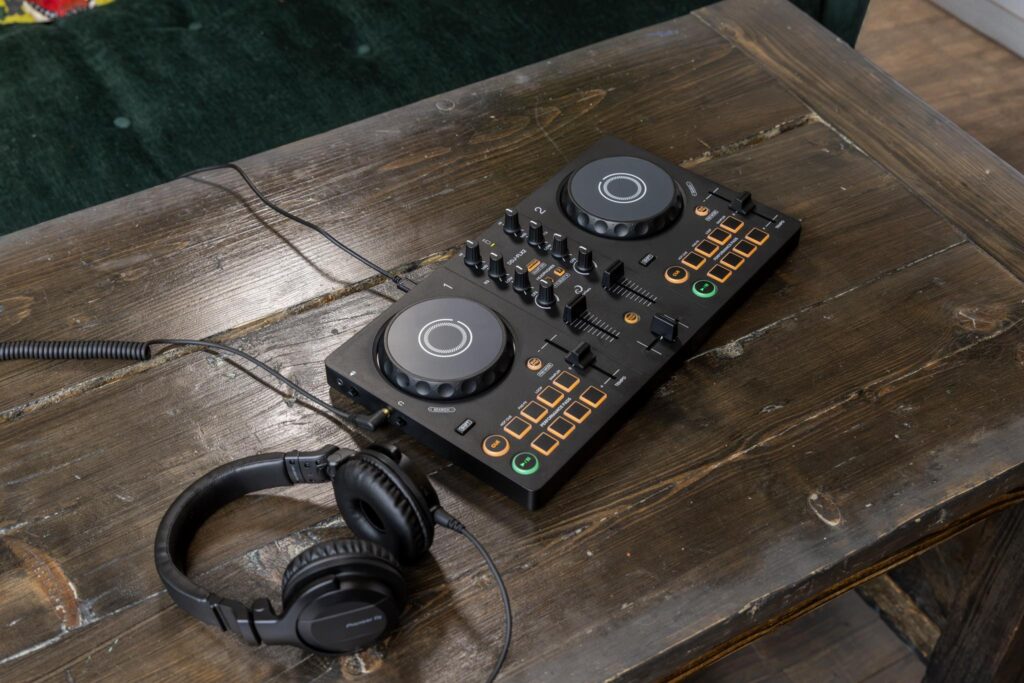AlphaTheta’s DDJ-FLX2 has launched into the entry-level market with its relatively affordable ($179 street price) compact controller that offers just enough for someone to master the core tenets of DJing.
Of course, the DDJ-FLX2 will feel instantly familiar to anyone who has used legacy Pioneer DJ products. It feels especially reminiscent of the Pioneer DDJ-200 from a few years back. Importantly, it doesn’t feel overwhelming to users who may be graduating from solely using software or might even have no DJing experience at all.
Stretching only 5-inches wide and weighing under three pounds, it’s one of the most portable and lightweight DJ controllers on the market. It follows the widely used two-deck-and-a-mixer controller layout that’s been the industry standard for controllers for a while now.
Each deck section has a fairly small touch-sensitive jog wheel capable of pitch bending and scratching. Holding down shift and moving the jog wheels activates a search function. One should note that they’re not the smallest jog wheels ever fitted to a controller, but they’re certainly a far cry from CDJs or turntables.
Below each jog wheel are eight performance pads. Calling them pads is a bit of a misnomer – they’re really square-shaped buttons made of hard plastic and click when pressed. Nevertheless, it’s impressive the number of functions they can do. They default into hot-cue mode, but other modes are available, including Pad FX, Loop, and Sampler. To successfully change pad modes, one holds down the shift and the beat-sync button to change between pad modes.
Also, the top row of pads light up to indicate which mode is active. This whole process takes some time, so it’ll definitely be tricky to, for example, trigger a hot cue and then immediately begin a loop. I’m glad there is the ability to do different things with the pads (especially since some entry-level controllers only allow hot cues from their pads), but I wish there was a better way to toggle between pad modes.

To the right of the performance pad is a tempo slider. I really like how long they made the tempo slider and the fact that there’s a confident click when the slider is in the neutral position. Notably absent from each deck section are looping controls or any effects control beyond the pad FX. That’s not a dealbreaker, by any means, but certainly worth mentioning.
Moving on to the mixer section, there are two fairly short channel faders – they’re not unusably short, but I did notice they were on the shorter side. Ditto for the crossfader – again, not unusably short but on the shorter side. Each channel comes with 3-band EQ controls, and there’s a color FX knob below the EQ.
There is no gain knob, but I never found myself explicitly wishing I had one during my testing. Software auto gain functionality has gotten so good that physical gain knobs might not be as necessary as they once were. At the center of the mixer section, there are buttons to assign each individual channel or the master output to the headphones.
In terms of inputs and outputs, there are two headphone jack-style 1/8-inch TRS connectors on the left side of the unit. One is for the headphone output and the other is for the master output. There are two small knobs next to each output to control the level. I’m really glad to see this controller having its own audio output. And, I’m also not mad that the output uses a headphone jack-style connector instead of the traditional RCA connectors.
Headphone jacks are so commonplace these days that it may be easier to connect to various speakers at house parties using a headphone jack and aux cable. Of course, you can always buy a headphone jack to RCA cable for connecting to systems requiring an RCA cable. On the back, there’s a USB-C connector for connecting the controller to a laptop or connecting the controller to a power source, if using a phone via a Bluetooth connection. Next to the USB-C port is a Kensington lock.
The verdict? I really liked my time with the DDJ-FLX2. It’s a compact controller with enough hardware features to get a solid foothold in the world of DJing. Good job, AlphaTheta.


![DDJ-FLX2: Doing a Lot with a Little [Review]](https://djlifemag.com/wp-content/uploads/2025/07/DDJ-FLX2_Lifestyle-image-3_LR_2048x1366-768x432.jpeg)